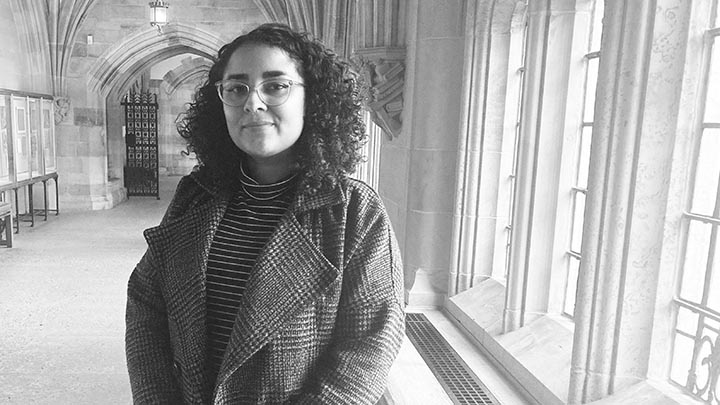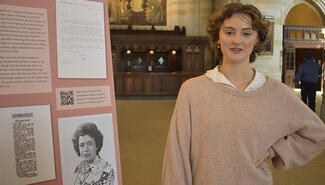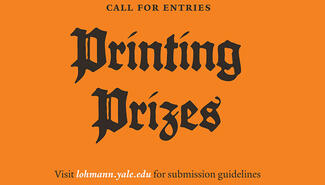Student curator Nancy Escalante: Finding community in the archives
When Nancy Escalante—curator of the new Hanke exhibit Empire and Resistance—arrived at Yale as a PhD student in American Studies, she had already discovered her passion for the archives and for museum work.
While studying history as an undergraduate at California State University, Los Angeles (Cal State LA), she pursued an internship at a “small” museum: the Museum of Social Justice in Los Angeles, a single room in the basement of a church.
“Because the team there was really small, I got to try my hand at a lot of different positions,” she said. “I got to do historical research to build content for the exhibitions. I also interviewed artists for their 2017 exhibition Con Safos: Reflections of Life in the Barrio. From the interviews, I wrote the labels for the wall. And I translated the labels into Spanish.
“Ideas of accessibility are really important to me, especially being in Los Angeles” she said. According to 2021 census estimates, people of Hispanic and Latino origin make up 49 percent of the city’s population. “We wanted the labels to reflect the community that comes into the museum, so we made sure everything was bilingual.”
Opening access
After completing her museum internship, Escalante worked as a student archives assistant at Cal State LA Special Collections and Archives. “There I had the opportunity to develop and create archival displays in collaboration with my colleagues. I learned about all the labor that goes into making archival materials––from appraisal to the finding aid––accessible to the public.”
In 2019, Escalante enrolled in a master’s program in history at Cal State LA. One day, while was doing research in the Latin American Studies department library, she asked if there were any political graphics about Central America in the collection. There were. A colleague took her to a room and opened a map case filled with folders of Central America solidarity posters from the 1980s. “Why are these posters just here in this dark room and not accessible to people?” she asked.
Escalante and her colleague approached the director of the Latin American Studies Department, who then agreed to donate the department’s posters to the university’s special collections: the Central American LA Solidarity Network Collection became the university’s first Central American–related archive.
“Cal State LA’s student body is largely Central American, and students always came into the archive looking for materials about Central America. Now there is a commitment from the university’s special collections to keep collecting materials about U.S. Central Americans.” Escalante’s parents are Central American, and, she explained, within the Central American diaspora, “we have a lot of conversations about historical memory.”
Those political posters were essential to Escalante’s thesis work. She also created a community pop-up exhibition with them, titled El Pueblo Vencerá!: La Lucha Salvadoreña en Los Ángeles (The People Will Win: The Salvadoran Struggle in Los Angeles).
Coming to Yale
In 2019, Escalante had a fellowship with the National Museum of American History in Washington, DC, through the Smithsonian Latino Center. While at the Latino Center (now the National Museum of the American Latino), she met a group of Latine students who were working on their PhDs. “We had a lot of shared interests, and a lot of the work we wanted to do was very community focused. Just being with that group really inspired me and solidified my commitment to apply to PhD programs.”
And why Yale in particular? “The American Studies program at Yale has a very strong focus on public humanities and offers a public humanities certificate. I felt this would be a place where my creativity would be encouraged and supported—especially because I am drawing from history fields, archival studies, museum studies, making my own program.”
Escalante’s exhibit in the Hanke Gallery of Sterling Memorial Library is subtitled “Transisthmian Views of Central America.” Relying on materials from Yale Library’s diverse special collections, Escalante has curated an exhibit that traces the long, contentious history that links the United States and the seven countries of Central America. The exhibit has many themes—activism and solidarity, movement and travel, forced migration, and religion—but the thread that runs through them is the idea of connection, of community, “beyond national boundaries and across centuries.”
The more than 50 objects on display include early nineteenth-century maps and broadsides that reveal Central America’s emerging, collective identity after gaining independence from the Spanish Empire in 1821. Late twentieth-century political cartoons, posters, and newsletters document the solidarity movements that formed—locally and internationally—to oppose new and ongoing challenges to the region’s freedom and independence.
Escalante’s work—at the Museum of Social Justice, at Cal State LA’s Special Collections and Archives, in fellowships at the Smithsonian Latino Center and the Getty Research Institute, and now at Yale— has prompted her deep thinking about where archival materials come from and the narratives they create.
“Sometimes we take for granted that these materials had a life before they became encapsulated in the archive. I have to be intentional to realize that the archives I am interpreting are also mediated, not only by the archivist, but by the person who donated the archive—how they organized it, the type of things they collected, what they want to leave in, what they want to leave out. All these things influence the type of narratives that I can tell,” she said.
“When I wrote my proposal for Empire and Resistance, I had a sense of the type of narrative that I wanted out of the exhibition. But when I came into contact with the sources, I had to be flexible about my narrative changing, because of what these sources were telling me.
“With the exhibitions I had done before coming to Yale, I started with secondary-source research or a paper in which an exhibition was supplementary. This exhibition was about going into the archives to see what I could find and then developing the argument. So, it was kind of a backward process for me, not having a solidified narrative to lean on. I hadn’t curated in that way before: encounter the source first. This experience gave me more insight about the necessity of being flexible and just being okay with the sources speaking for themselves, and not trying to force a narrative.”
Building a community archive
After completing her doctorate, Escalante hopes to return to the Smithsonian as a curator for the National Museum of the American Latino. She will also continue her work on an independent, grassroots community project in Los Angeles. “Developing the community archive is really my life’s work,” she said.
The community project under way is focused on the poetry of María Guardado, a well-known activist in Los Angeles, who died in 2015. During the 1990s, Guardado distributed hand-written copies of her poems at rallies and protests. During quarantine in 2020, Escalante and 15 other members of the community formed a committee to create an archive of Guardado’s life and political activism. “We started interviewing people who knew her, located copies of her poetry, translated it into English, and then asked community members to write their critical responses.”
So far, the committee has gathered 55 of Guardado’s poems. When they have finished their work, they hope to print a monograph of Guardado’s poetry, including the response essays. “A lot of the choices have been collectively made,” Escalante said. “I think it’s important to note that, to add to the provenance or add a historical note that tells how this archive came into being—so that whoever engages with this archive understands the social life of it.”
This work with Guardado’s archive also forms the basis of Escalante’s dissertation. She is doing what she describes as “autoethnographic and ethnographic writing about the process of archiving alongside the other members of the María Guardado collective.” In addition to the poems, the archive includes photos and newspaper clippings that the poet assembled into binders and handed out before she died to the people closest to her.
“I’m focused on the choices that we made as a collective. I’m basically looking at the process,” Escalante explained, “not the finished product. Writing and thinking about the process of building an archive is really valuable. For our community,” she added, “this process is simultaneously a transmittance of historical memory and a form of archival redress.”
To learn more
Escalante will discuss her exhibition in a Mondays at Beinecke online talk on Feb. 20 at 4 pm. The exhibit Empire and Resistance: Transisthmian Views of Central America opens in the Hanke Gallery, Sterling Memorial Library, that day and will be display through Aug. 13.
Escalante will also be giving a curator’s talk at an opening reception in Hanke Gallery on Thurs., Feb. 23, at 4 pm, and she will be available for questions and conversation over light refreshments afterward in Sterling Library’s lecture hall.
Photo and story by Deborah Cannarella
Image: Curator Nancy Escalante, PhD student, Department of American Studies



